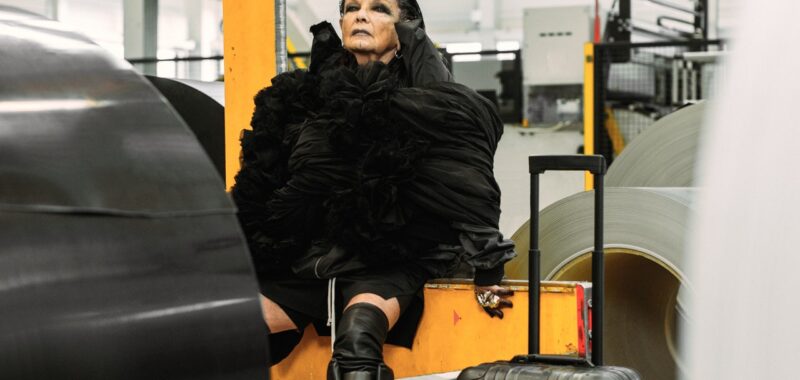Itâs hard to picture Rick Owensâthe fashion designer best known for his starkly alien, Brutalist-meets-Gothic aesthetic sensibilityâin someplace as mundane as, say, a Delta Lounge. His attenuated frame, draped in gauzy layers of black and balanced on his teetering platform boots, grabbing some yogurt at a Marks & Spencer in Charles de Gaulle? Unthinkable! And yet, the man has to travel, doesnât he? âOh, I donât like to travel,â Owens told GQ from Paris on Thursday, just hours after unveiling his fall-winter 2025 collection on the runway. âEspecially long flights. Luckily, I donât have to travel as much as other people do.â
So perhaps itâs somewhat surprising that Owens’ latest collaborationâfollowing linkups with everyone from Moncler and Champion to Aesop and Converseâhas travel at its core. For his new partnership with Rimowa, Owens has recast the German luxury brandâs iconic roller suitcase in his own freaky image. That meant bronzing the familiar ribbed aluminum exterior by hand through a painstaking pigment application process, leaving each of the 500 limited-edition models with a wholly unique rusted veneer. Owens was inspired by the bronze sculptures of artwork greats Richard Serra, Alberto Giacometti, and Constantine Brancusi, but one can also see in their turgid, muddy coloring a flash of Owensâs love of all things sordid and earthy.
âThe moment I got mine, with its leather-lined interior and matching toiletry bag, I thought, âHow did I last so long without this?ââ said Owens. To finish things off right, the designer crafted severe and sumptuous baggage tags from calfskin and coarse hairâwhich his models also wore around their necks as accessories during todayâs fashion show.
The suitcases, which will retail for $3,525, are scheduled to hit Rimowaâs online store and select physical locations on January 30. GQ spoke exclusively to Owensâafter his post-show nap and before he went downstairs for a warmed-up cookieâabout the collaboration, his travel habits, his favorite hotels, and much more.
Matteo Carcelli
GQ: Iâm assuming you were familiar with Rimowa before they approached you?
Rick Owens: Oh yeah, Iâve been using a Rimowa for ⦠not quite 20 years, but definitely more than 10 or 15. I bounce between Italy and Paris, so itâs a constant fixture in my life, like a phone or a toiletâtheyâre essential. I think about essential things all the time, because I like reducing my life to essential things, and not needing a lot.
You wanted the suitcases to look like bronze, and you often use really monumental materials like marble or travertine in your homes. Itâs almost like youâre trying to turn everyday objects into sculptures, imparting in them a sense of permanence.
I believe in havingâneedingâless things, but making each thing count more. And it is an attitude that is about non-disposability and permanence. I make very conscious choices. Someone once asked me, âIsnât that very OCD?â And I thought, not really. I think everybody would want to customize everything around themselves if they could.
Oh yeah, theyâre functional sculptures.
What made you want the Rimowaâs interiors to be leather?
It made me think like a 1930s movie star like Marlene Dietrichâshe would’ve had a leather-lined carry-on.
I noticed you had the models wearing the tags as necklaces on the runway.
I was just trying to think of a way to be able to talk about Rimowa as being part of the show, but the whole project ended up being so profoundly part of the collection. Because [I was] working with Rimowa and thinking about itâabout reducing, and making choices count more, and traveling for all of the years. I travel to this little town [Concordia, Italy, where Owens owns an apartment across the street from his factory] to try and craft something as magical as I could in this austere isolation.
This sounds douchey, but there’s an element of self-deprivation when you are not living in the most glamorous place. You are there to work in a factory that is all functional, all industrial, and there’s no beach, no nightclubs, no restaurants. It’s all work. And I love it. It’s monastic.


.jpg)